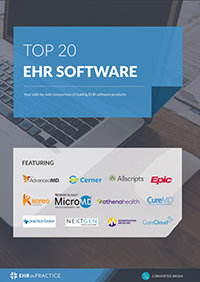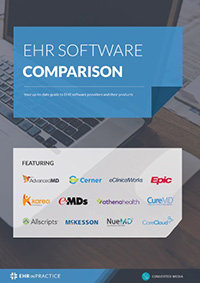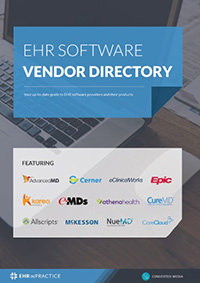Epic EHR vs Cerner EHR comparison
EHR software is widely used everywhere from small primary care offices to some of the largest healthcare systems in the world. There are no two companies that are more well known than Cerner and Epic. Since their inception in 1979, the two companies have dominated the market share for EHR systems. In 2020, Epic is said to be used to manage the records of 54% of patients in the United States and is said to have 31% of the total market share, while Cerner comes in at a close second with 25% of the market share.
They have evolved similarly through the years, often keeping pace with one another around developments and new software functionalities that can make it difficult to choose what your best option might be when considering a new EHR. We’re comparing Cerner vs Epic in this article to discuss how their features, customer size, and pricing compare against each other.
Epic vs Cerner feature comparison
Both Epic and Cerner boast impressive clinical applications specific to the specialty offered by your practice including everything from Dermatology to Rehabilitation to Fertility. Epic in particular has around 24 modules catering to specific specialties which were supported by professionals in each field to ensure the platform met the actual needs of each specialist. Cerner has more than 50 dedicated modules for various specialty practices. Both platforms are open and interoperable meaning that they are highly customizable to fit the specific needs of your practice so you have all of the tools you need at your disposal regardless of your specialty or practice size and you’re able to share patient information securely across health systems without any snags.
For your patients, both Epic and Cerner offer telehealth solutions which have been an emerging demand during the COVID-19 pandemic. Cerner offers a telehealth platform called Virtual Health Care that was first implemented to improve patient care in rural areas. Epic offers telehealth services for a variety of patient and customer needs offering a virtual means of referral services, real-time patient monitoring, peer-to-peer consultation, and tools for ongoing patient care either during the patient’s hospital stay or after discharge.
Additionally, both software providers offer a patient-facing platform to communicate notes, images, and lab results. Cerner uses a platform called ‘HealthLife’ that allows for more open engagement between the physician and the patient, providing them with tools to manage their health proactively. Epic has a patient-facing platform called ‘MyChart’ where they can message their providers, attend virtual visits, and schedule appointments.
There are several features Cerner and Epic both have mobile capabilities. Epic provides many different applications for mobile, offering ‘Canto’ for tablets, ‘Haiku’ for phones, and even ‘Limerick’ for your smartwatch. Cerner also comes equipped with a mobile app called ‘Powerchart Touch’ which allows your practitioners to access the EHR on the move from their mobile device, take notes, receive and send messages, and even upload pictures.
If you’re managing your own practice, the revenue cycle management tools available on the Cerner and Epic platforms are fully comprehensive. Epic EHR allows for fast patient payment options to fit the needs of all of your patients and automates revenue and coding from clinical activity on the app so you don’t miss anything while encouraging the most cost-effective treatment strategies for your patients. Cerner’s works similarly, allowing for much better reimbursement and accounting processes with their tool RevWorks.4
Epic vs Cerner - what size are their customers?
When considering Epic versus Cerner and the differences in value that they could bring to your practice, it is sometimes important to consider the benefit each could have on your specific practice size. Usually, one size does not fit all and that is certainly something Cerner understands as they offer more than 50 modules by specialty catering to everyone from small practices to large health systems and laboratories.
Epic has more recently opened its functionality to smaller and mid-sized practices. Although Epic has dominated the market as a key EHR provider for large healthcare institutions, they have recently developed a newer, more affordable version of their EHR called ‘Sonnet’ that caters to smaller practices with a more realistic price tag for those practices.
Epic vs Cerner pricing
What is the price tag for Cerner and Epic? There is a more complicated answer to that question than providing a simple price tag. It is important to consider also the cost of EHR implementation which includes licensure, training, customization, maintenance, and support. It is well known that there is a multitude of these hidden fees related to the implementation of Epic vs Cerner. That stated, Epic’s software solution is self-hosted and starts at $1200.00 while Cerner’s Cloud-Based software starts at $25.00 per user per month.1 After all of the added fees associated with the implementation of each platform, Cerner is considered considerably more affordable by most customers while Epic customers claim to get more value for the money they spend.
Sources:
https://www.ehrinpractice.com/epic-ehr-software-profile-119.html
https://www.ehrinpractice.com/cerner-ambulatory-ehr-software-profile-113.html
https://www.beckershospitalreview.com/ehrs/ehr-market-share-2021-10-things-to-know-about-major-players-epic-cerner-meditech-allscripts.html
https://ehrguide.org/ehr-reviews/epic-reviews/
https://ehrguide.org/top-ehr-software/cerner-ehr/
Free white paper

Top 20 EHR Comparison
Compare the top EHR systems on offer in our comparison guide

Featured white papers
Related articles
-

Cloud EHR vs on-premise EHR: an objective comparison
The main factors to consider when choosing between a cloud EHR or an on-premise EHR
-

What to consider when comparing EHR systems
Three key factors to keep in mind when comparing EHR systems
-

Epic vs athenahealth: an objective comparison
How do Epic and athenahealth compare across customer rating, price, market share and more?




